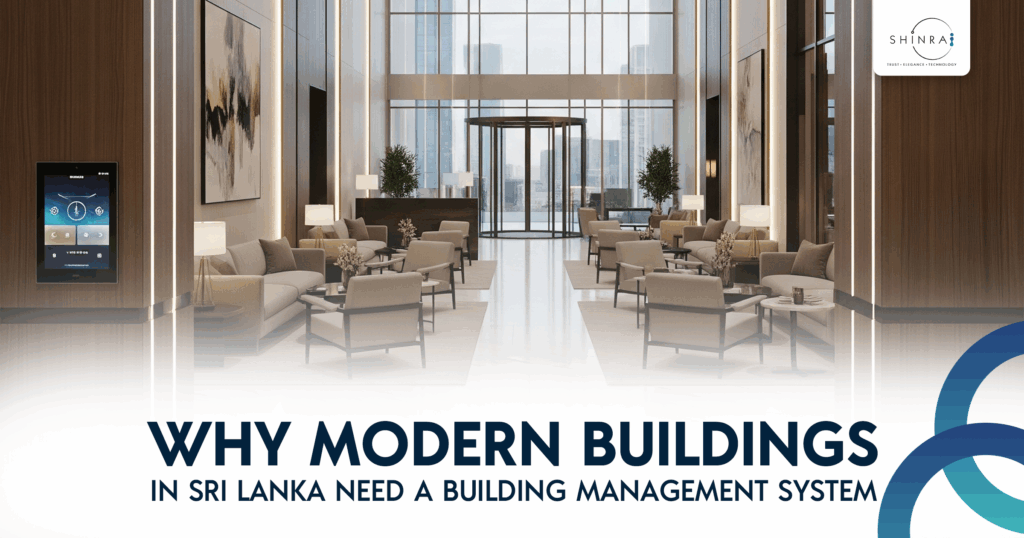In the dynamic urban landscape of Sri Lanka, modern buildings whether commercial complexes, high-rise residential towers, or mixed-use developments face mounting challenges: soaring energy costs, rising expectations for occupant comfort and safety, and a pressing need for sustainability. That’s where a cutting-edge Building Management System (BMS) from Shinrai Smart Home becomes indispensable not a luxury, but a strategic necessity.
1. Enhanced Energy Efficiency & Operational Cost Savings
A primary advantage of a BMS is its ability to dramatically boost energy efficiency. By intelligently monitoring and controlling key building systems HVAC, lighting, and more a BMS adjusts operations based on occupancy, schedules, and external conditions, curbing energy waste and lowering utility bills.
In Sri Lanka, where high electricity charges often strain operating costs, the impact is even more significant. For example, when Sri Lanka’s Seylan Tower adopted Schneider Electric’s BMS, it achieved over 20% energy savings, showcasing just how effective BMS technology can be in practice.
Further substantiating this, global studies show that smart buildings equipped with BMS can lower energy usage by 30–50% compared to traditional facilities . These figures underscore why energy-conscious developers and property managers in Sri Lanka are turning to BMS as a key tool for energy management, operational cost reduction, and long-term sustainability.
2. Superior Occupant Comfort & Productivity
Comfort-driven metrics temperature, lighting, air quality influence occupant satisfaction and productivity. A BMS ensures that these parameters are consistently optimized, creating healthier, more comfortable indoor environments for residents, employees, and visitors alike.
Such environments not only reduce discomfort but also support better focus and wellbeing key for both residential comfort and commercial performance. For mixed-use buildings in Sri Lanka, this translates to higher tenant retention and improved reputation.
3. Integrated Safety, Security, & Emergency Response
Safety and security are fundamental to modern building operations. A robust BMS provides centralized control over access systems, CCTV, fire alarms, gas detection, and ventilation controls, enabling faster response during emergencies (shinrai-smarthome.lk).
In emergency scenarios such as a fire BMS systems can trigger alarms, adjust ventilation to control smoke, and manage elevator behavior, significantly enhancing occupant safety .
In Sri Lanka’s environment where building emergencies can escalate rapidly this integration isn’t just value-add; it’s critical. The centralized visibility and response offered by BMS dramatically boost preparedness and resilience.
4. Centralized Control, Remote Monitoring, & Predictive Maintenance
A BMS centralizes control of disparate building systems via a single, intuitive interface allowing facility managers to monitor performance, set schedules, and respond to alerts in real time (shinrai-smarthome.lk).
Modern BMS platforms also enable remote monitoring and control, providing flexibility and responsiveness from anywhere with internet access. This feature is especially valuable for managing multiple properties or for off-hour emergencies.
Through predictive maintenance, BMS systems analyze operational data to detect anomalies before breakdowns occur, reducing downtime and maintenance costs :
“Energy consumption dropped by 15–20% in BMS-monitored buildings compared to non-BMS benchmarks. Labor hours for maintenance decreased by 12% due to predictive scheduling.” (Reddit)
This proactive stance is vital in reducing disruptions and preserving system integrity particularly in critical infrastructure like hospitals, high-rises, and commercial hubs.
5. Scalability, Future-Proofing, & Sustainability
A modern BMS like Shinrai’s ABB-powered Newron platform offers scalability and flexibility to accommodate evolving protocols, systems, and building needs (shinrai-smarthome.lk).
As IoT, AI, and cloud technologies continue advancing, buildings equipped with adaptive BMS infrastructure can seamlessly integrate new capabilities making them future-ready.
Additionally, BMS supports sustainability initiatives: optimizing resource use, aiding in green building certifications, and tracking ESG metrics. In Sri Lanka’s push toward energy-efficient construction and smart building regulation, BMS adoption is a vital catalyst.
6. Market Trends & Local Drivers in Sri Lanka
The Sri Lankan market is strongly motivated to adopt BMS due to rising demand for smart, energy-efficient buildings across commercial, residential, and industrial sectors .
Nevertheless, challenges remain:
- High upfront installation costs
- Limited availability of skilled technicians
- Data security and privacy concerns
Yet, the government is moving strategically to incentivize BMS adoption through regulatory revisions and financial support aimed at promoting energy-efficient construction .
Combining Shinrai’s localized expertise with globally proven BMS solutions effectively bridges these gaps by offering scalable, efficient, and supported installations.
7. Shinrai Smart Home’s Edge in BMS Deployment
Shinrai Smart Home leverages ABB’s Newron platform, delivering a flexible, scalable, and future-proof BMS solution tailored for Sri Lanka’s architectural landscape (shinrai-smarthome.lk).
Key advantages include:
- Integration across HVAC, lighting, shading, fire safety, security, and more
- Features such as scheduling, alarms, and visual interfaces for real-time actionable insights
- Suitability for buildings of any scale from smart homes to high-rise towers or industrial sites (shinrai-smarthome.lk)
Shinrai’s in-depth local presence ensures responsive support, adaptation to regulatory changes, and alignment with Sri Lanka’s smart building goals.
Conclusion
For modern buildings in Sri Lanka, deploying a BMS is no longer optional. It’s essential for:
- Driving energy saving and cost efficiency
- Ensuring occupant comfort, safety, and security
- Enabling centralized control and predictive maintenance
- Supporting scalability, sustainability, and future technology adaptation
Through Shinrai Smart Home’s advanced BMS solutions powered by ABB’s Newron, property owners can lead the way in building smarter, greener, and more resilient structures.
Call to Action
Interested in maximizing energy efficiency, ensuring safety, and future-proofing your building with the latest in Building Management System (BMS) technology? Contact Shinrai Smart Home now to explore tailored BMS solutions and transform your building into an intelligent, sustainable asset.

